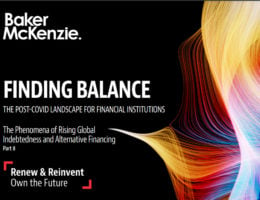The business models of financial institutions are changing: how services are delivered, the ways in which they can earn revenue and the search for new ways to monetize value. COVID-19 has accelerated the take-up of digital transformation due to the need to conduct more business remotely through digital channels. Simultaneously, customers have shown a greater willingness to use technologies in which previously they may have lacked confidence.
Read our ninth installment focused on the impact of new technology on financial institutions.
The risks arising from unsustainable indebtedness to which both traditional and alternative financing sectors have exposure are higher in emerging economies, where the debt burden is much more elevated generally and whose borrowers are more susceptible to default if (as is expected), US dollar interest rates rise. Emerging economies with less policy intervention, monitoring and regulation are more vulnerable than advanced economies. This eighth installment focuses on the phenomena of rising global indebtedness and alternative financing.
COVID-19 represents one of the greatest ever shocks to our economies and, in consequence, to the business models of financial institutions and the way they do business. While many changes to business processes and operations were already taking place prior to the pandemic, COVID-19 has given many added impetus and urgency. Decision-makers must choose between adapting a wait-and-see approach or implementing more proactive strategies to safeguard and, if possible, grow their businesses.
COVID-19 represents one of the greatest ever shocks to our economies and, in consequence, to the business models of financial institutions and the way they do business. While many changes to business processes and operations were already taking place prior to the pandemic, COVID-19 has given many added impetus and urgency. Decision-makers must choose between adapting a wait-and-see approach or implementing more proactive strategies to safeguard and, if possible, grow their businesses.
A COVID-19 represents one of the greatest ever shocks to our economies and, in consequence, to the business models of financial institutions and the way they do business. Decision-makers must choose between adapting a wait-and-see approach or implementing more proactive strategies to safeguard and, if possible, grow their businesses.
Baker McKenzie Latin America Financial Institutions industry group’s FintechFest is the first of a series of webinars that aims to provide insights on key market trends, opportunities, and legal and regulatory challenges to guide financial institutions and technology companies through the panoply of issues in the rapidly evolving fintech sector. In Latin…
As the energy, mining and infrastructure industry in Latin America looks ahead to the new year, we present the Latin America EMI Hot Topics Guides for 2021 to facilitate discussions about the key trends we see in each sector. We invite you to read the guides to learn more about…
COVID-19 represents one of the greatest ever shocks to our economies and, in consequence, to the business models of financial institutions and the way they do business. While many changes to business processes and operations were already taking place prior to the pandemic, COVID-19 has given many added impetus and…
As the energy, mining and infrastructure industry in Latin America looks ahead to the new year, we present the Latin America EMI Hot Topics Guides for 2021 to facilitate discussions about the key trends we see in each sector. We invite you to read the guides to learn more about…
Baker McKenzie Latin America Financial Institutions industry group’s FintechFest is the first of a series of webinars that aims to provide insights on key market trends, opportunities, and legal and regulatory challenges to guide financial institutions and technology companies through the panoply of issues in the rapidly evolving fintech sector. In Latin…








